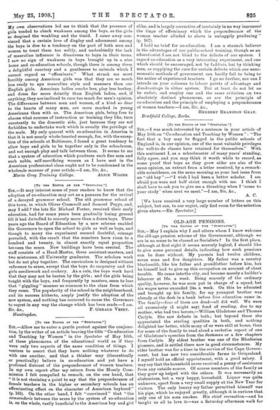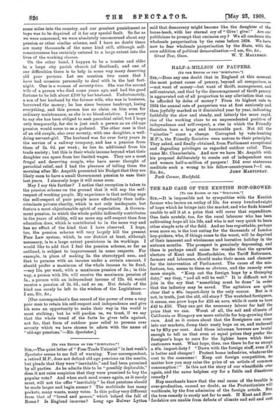OLD-AGE PENSIONS.
[TO Tin • EDITOR OP THE "SP Norvron....] Stn,—May I explain why I and others whom I know welcome the old-age pension scheme of the Government, although we are in no sense to be classed as Socialists ? In the first place, although at first sight it seems scarcely logical, I should like to give some personal details, indicating bow such pensions can be done without. My parents bad twelve children, seven sons and five daughters. My father was a country blacksmith, like his father and grandfather before him, but he himself had to give up this occupation on account of chest trouble. He came into the city, and became merely a builder's labourer at 16s. a week. Being scarcely of the ordinary quality, however, he was soon put in charge of a squad, but his wages never exceeded 24s. a week. On this he educated and brought up his family, for my youngest brother was already at the desk in a bank before free education came in. The family—four of them are dead—all did well. We were all excessively (I might say) fond of reading, due to my mother, who had two heroes,—William Gladstone and Thomas Carlyle. She saw defects in both ; but beyond these she appreciated the sterling qualities in both, and nothing delighted her better, while many of us were still at home, than for some of the family to read aloud a verbatim report of one of Gladstone's speeches from the Scotsman or a few chapters from Carlyle. My eldest brother was one of the Rhodesian pioneers, and is settled there now in good circumstances. My elder brother was for a time in the service of the Cape Govern- ment, but has now two considerable farms in Griqualand. I myself hold an official appointment, with a good salary. I may say that the household never received a penny of assistance from any outside source. Of course members of the family as they grew up helped with the others. It was necessarily an abstemious, but a very happy, household. Liquor was quite unknown, apart from a very small supply at the New Year for visitors. The only luxury my father permitted himself was his pipe, which be enjoyed greatly, although it is curious that only one of his sons smokes. His chief recreation—and be taught us all to love it—was a Saturday afternoon walk for
some miles into the country, and our greatest punishment as boys was to be deprived of it for any special fault. So far as we were concerned, we were absolutely unconcerned about any pension or other similar scheme, and I have no doubt there are many thousands of the same kind still, although self- consciousness has certainly entered to a large extent into the lives of the working classes.
On the other hand, I happen to be a trustee and elder in a large city parish church (of Scotland), and one of our difficulties there is to help in some way many deserving old poor persons. Let me mention two cases that I have had occasion personally to deal with in the last fort- night. One is a woman of seventy-two. She was the second wife of a person who died some years ago, and had the good fortune to be left about. £100 by her husband. Unfortunately, a son of her husband by the former wife, who was in business, borrowed the money; he has since become bankrupt, losing everything, and this person has no claim on him even for ordinary maintenance, as she is no blood-relative. I am sorry to say she has been obliged to seek parochial relief, but I hope only temporarily, for she is just such a person as an old-age pension would come to as a godsend. The other case is that of an old couple, also over seventy, with one daughter, a well- doing servant-girl. The husband was for over forty years in the service of a railway company, and has a pension from them of 2s. Gd. per week ; he has 4s. additional from his trade society ; but this is their whole income beyond what their daughter can spare from her limited wages. They are a most frugal and deserving couple, who have never thought of parochial relief, and I had the pleasure of telling them the morning after Mr. Asquith presented his Budget that they are likely soon to have a small Government pension to ease their last years. I sincerely hope it will come soon.
May I say this further? I notice that exception is taken to the pension scheme on the ground that it will sap the self- respect of working people. My experience is that nothing saps the self-respect of poor people more effectually than indis- criminate private charity, which is not only inadequate, but fosters a most objectionable spirit of expectation. A Govern- ment pension. to which the whole public indirectly contributes in the years of ability, will no more sap self-respect than free education does, which is contributed to in the same way and has no effect of the kind that I have observed. I hope, too, the pension scheme will very largely kill the present Poor Law system, which, in our district at least, although necessary, is to a large extent pernicious in its workings. I would like to add that I feel the pension scheme, so far as outlined, is subject to improvement in some respects. For example, in place of making 5s. the stereotyped sum, and that to persons with an income under a certain amount, I should prefer a maximum of the whole income to be fixed, —say 15s. per week, with a maximum pension of 5s.; in this way, a person with 10s. will receive the maximum pension of 5s., a person with an independent income of 12s. 6d. would receive a pension of 2s. Gd., and so on. But details of the kind can surely be left to the wisdom of the Legislature.— [Our correspondent's fine record of the power of even a very poor man to retain his self-respect and independence and give his sons an opportunity to make their way in the world is most striking; but he will pardon us, we trust, if we say that the whole trend of the facts he gives tells against, not for, that form of outdoor poor relief to persons over seventy which we have chosen to adorn with the name of "old-age pensions."—En. Spectator.]







































 Previous page
Previous page